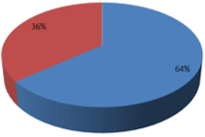Abstract
Coronavirus disease (COVID-19) is a newly discovered infectious disease caused by a virus named "coronavirus." The lockdown due to COVID 19 has largely affected the lives of students as they no more get to interact on a one on one basis with their teachers. This shift in education from traditional classroom learning to computer-based learning might be one of the largest educational experiments to date. As the online teaching-learning process has become more prevalent in India due to COVID 19 pandemic, it becomes particularly important to know its growth and to know whether it's actually helping the students achieve what they expect out of college. The present study was therefore designed to understand the student's perspective, attitudes, and readiness about online classes being conducted at the University level. An Observational, Descriptive study was conducted. The data was collected using a Questionnaire. The present study was carried out amongst 200 students. After analyzing the results, it was found that 74% of the students liked studying through online classes. The most common reason (49%) as to why the students like studying online were that the study time becomes flexible, and they can study anytime they want. Lack of co-curricular activity was the most common issue (34%) of online classes, as reported by the students. Most of the students were found satisfied with the content and procedure of online teaching. About 30% of the students reported that they prefer their lecture being delivered through a PPT with an audio recording. The present study that was conducted among college students revealed that maximum students are in favor of studying through online classes, but they feel that there is a lack of co-curricular activities in the online mode of conducting classes. As the students are in favor of online classes, such classes must be continued with some interventions. Education Ministry must develop certain rules and guidelines wherein certain online activity sessions can be made compulsory along with regular lecture sessions.
Full text article
Authors

This work is licensed under a Creative Commons Attribution-NonCommercial-NoDerivatives 4.0 International License.

